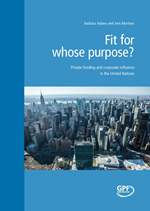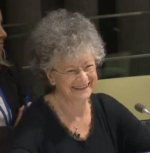Published on Fri, 2015-09-25 08:46
More than a hundred Heads of State and Government will gather in New York this week to adopt the 2030 Agenda for Sustainable Development. This agenda is intended to make the UN ‘fit for purpose’, but it is important to ask, ‘whose purpose will it be fit for’? A new study from Global Policy Forum warns that the United Nations is embarking on a new era of selective multilateralism, shaped by intergovernmental policy impasses and a growing reliance on corporate-led solutions to global problems. The changing funding patterns of the UN and its funds, programmes and specialized agencies reflect these alarming trends. Key features are the growing gap between the scale of global problems and the (financial) capacity of the UN to solve them; the growing share of non-core contributions and earmarked trust funds in UN finance; increased reliance on the corporate sector; and the outsourcing of funding and decision-making to exclusive global partnerships. |
Published on Fri, 2015-09-25 08:31
LDC Watch has released a statement addressing the Post-2015 Summit on 25-27 September 2015 in New York, which will adopt the post-2015 development agenda comprising a set of 17 sustainable development goals (SDGs) with a timeline until 2030. We have expressed grave concerns over the outcome document “Transforming Our World – the 2030 Agenda for Sustainable Development” especially about Means of Implementation and Global Partnership which is key to achieving the post-2015 development agenda. We have reiterated our campaign call 'NO SDGs without LDCs'! |
Published on Mon, 2015-09-14 09:24
"The UN must champion a process of truth and reconciliation" in development, said Barbara Adams, on behalf of Global Policy Forum and Social Watch during a round table at the United Nations in New York. Adams emphasised that "those who have benefitted the most from the past and current model are those that need to change the most". |
Published on Sun, 2015-09-13 10:52
Thousands of people have had their lives destroyed by the activities of multi-national corporations. Oil spills in Nigeria and gas leaks in India have killed, maimed and caused lasting environmental damage. Yet, these people and their families have struggled to hold the perpetrators to account and receive damages to ameliorate their suffering. This lamentable situation could be addressed by consensus between states around the world to develop a treaty that ensures human rights violations do not go unpunished (or, at least uncompensated). In the 21st century such a treaty is both a legal and moral necessity. Here is why. |
Published on Sat, 2015-09-12 17:56
The Supreme Court (SC) has ordered the executive and legislative departments to answer a recent petition of anti-pork barrel advocates against the government’s spending of lump sum and discretionary funds in this year’s budget. In session yesterday, the justices decided to require the Palace and both houses of Congress to comment on the petition for certiorari and prohibition filed last Sept. 1 by Social Watch Philippines, led by former national treasurer Leonor Briones. |
SUSCRIBE TO OUR NEWSLETTER







